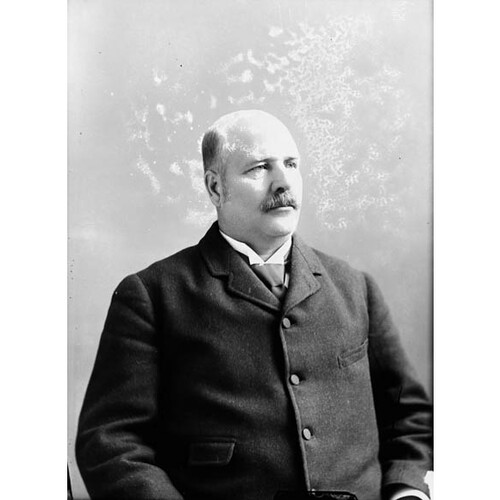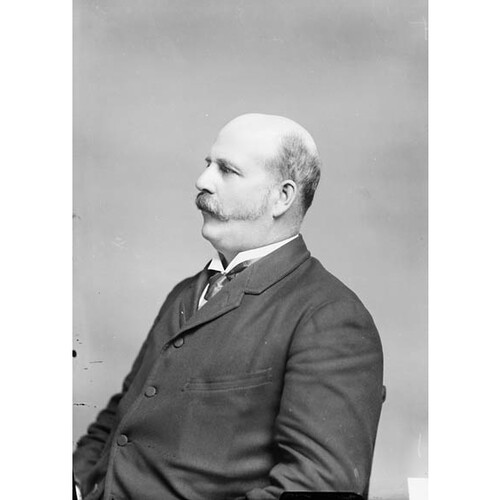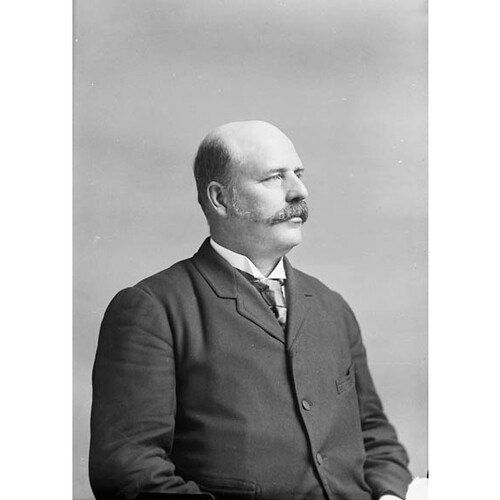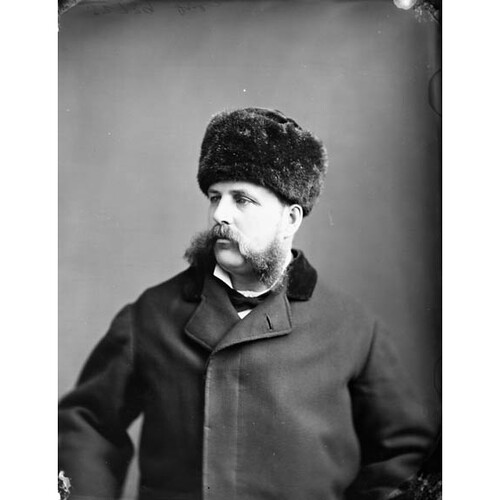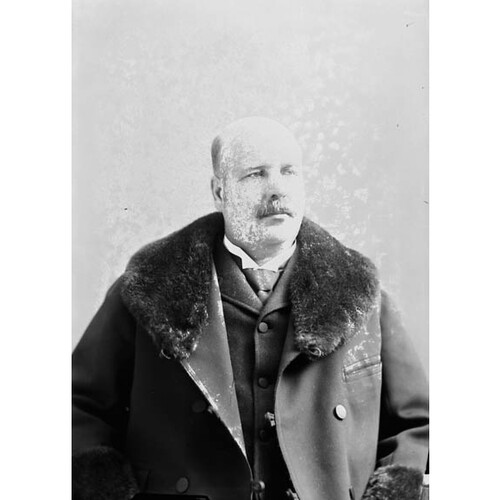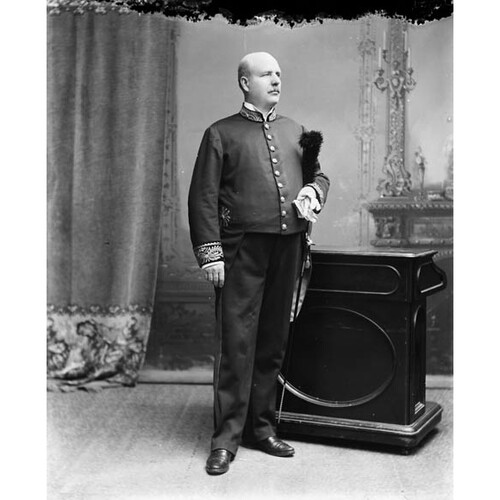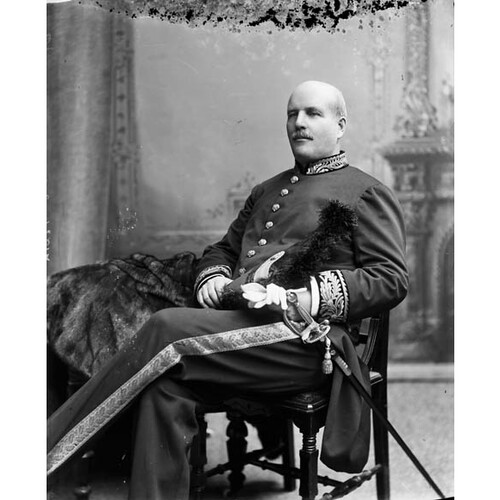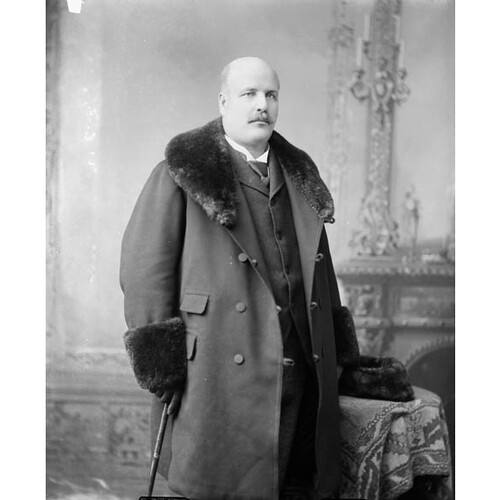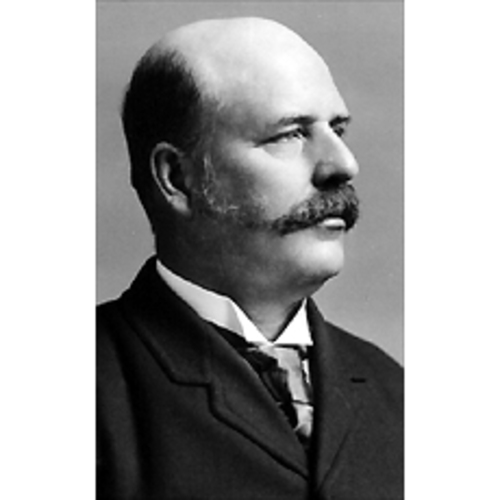As part of the funding agreement between the Dictionary of Canadian Biography and the Canadian Museum of History, we invite readers to take part in a short survey.
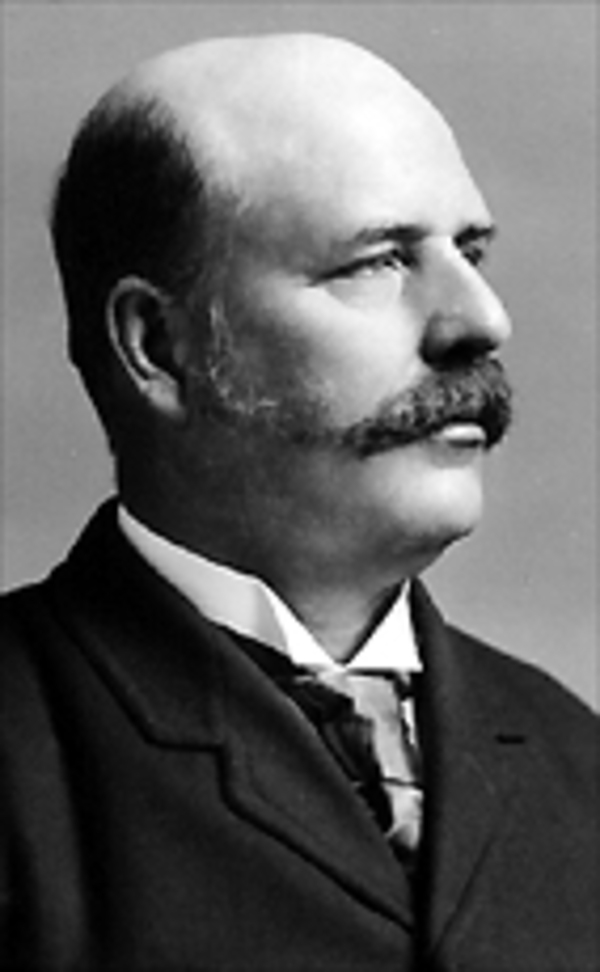
Source: Courtesy of Wikimedia Commons
IVES, WILLIAM BULLOCK, lawyer, businessman, and politician; b. 17 Nov. 1841 in Compton Township, Lower Canada, son of Eli Ives and Artemissa Bullock, loyalists from Connecticut; d. 15 July 1899 in Ottawa.
After studying at the village school in Compton, young William Bullock Ives attended the Compton Academy for four years, and then he continued his education on his own before undertaking the study of law at Sherbrooke. He was called to the bar on 18 June 1867 and practised his profession mainly in Sherbrooke, in the office of Henry B. Brown and C. A. French, among others. In 1880 he was named a qc.
On 20 Nov. 1869, at Cookshire, Ives married Elizabeth Emma Pope, the only daughter of John Henry Pope*. They would have no children. For Ives’s career and fortune, this marriage to the daughter of one of the region’s wealthiest and most influential businessmen, who was a pillar of the Conservative party in the Eastern Townships and subsequently a cabinet minister under Sir John A. Macdonald, would be of decisive importance. Ives’s political initiation came at the municipal level in January 1875, when he was elected councillor for the East Ward of Sherbrooke, a post he retained for four years. Chosen mayor for 1878, he was elected that year for the constituency of Richmond and Wolfe to the House of Commons. He continued to represent this riding until 1891, being re-elected in 1882 and 1887. From 1891 he ran in Sherbrooke, where he was successful in the elections of 1891 and 1896, as well as in a by-election in 1892.
Ives, an ardent Conservative, was respected for the competence in matters of business law and foreign trade that he brought to the house. His first speech, favouring a protective tariff on manufactured goods, showed a sound knowledge of economic factors as well as a firm commitment to his party’s National Policy. Like his father-in-law, who in 1885 became minister of railways and canals, he unwaveringly supported government assistance for the building of the Canadian Pacific Railway. It was no doubt to these qualities that he owed his elevation to the Privy Council and his appointment as its president on 7 Dec. 1892, an office that gave him ministerial rank in the new Conservative cabinet of Sir John Sparrow David Thompson. On 21 Dec. 1894 he became minister of trade and commerce under Mackenzie Bowell* and in this capacity he was involved in the arduous discussions dividing the federal government on the advisability of introducing legislation to remedy the funding difficulties of the separate schools in Manitoba. He and six other Protestants in the cabinet resigned on 4 Jan. 1896 in an attempt to force the hand of Bowell, who in turn resigned. When Sir Charles Tupper* assumed office as prime minister, Ives was reappointed within days. He remained in office until the ministry was defeated in July.
In addition to his career in politics, Ives rose to prominence in the business world. His marriage enabled him to make a name for himself in sectors where his father-in-law was well established – the lumber industry, cattle raising, and railway construction – especially in the region east of Sherbrooke.
In 1882 Ives and three partners bought a sawmill at Cookshire and founded the Cookshire Mill Company. The new firm rapidly acquired rights to 46,000 acres of timber reserves and enlarged the mill to make it a major operation that channelled almost all its output to the South American market. Ives and his brother-in-law Rufus Henry Pope* quickly became its sole shareholders. Not long after, Ives founded the Scotstown Lumber Company, of which he became president. Its main sawmill, in Scotstown, processed timber from the region of Mont Mégantic. He thereby gained control of most of the lumber in the eastern part of the Eastern Townships. Seeking more diverse markets, he soon developed an interest in pulpwood, which his two companies began exporting to the United States. The next logical step was to manufacture on his own premises the pulp for paper-making. In 1884, with the backing of partners in the region and at Montreal, Ives set up a pulp factory in Scotstown (with the Salmon River Pulp Company) and in 1891 he bought the factory in East Angus. He was also made president of the Royal Pulp and Paper Company, which installed a paper-mill in that town. In 1893, with a restructuring of the firm, renamed Royal Paper Mills Company, Ives was reduced to a minority shareholder. Following the defeat of the Conservative government in 1897, he became manager of the East Angus plants and helped set up a new bisulphite pulp plant.
Involvement in the lumber and paper industries made Ives aware of the need for improved transportation between the Cookshire area and the United States. Thus in 1887 he promoted the construction of the Hereford Railway to link northern New Hampshire and Cookshire. He became the guiding light of the project and managed to interest a syndicate of American businessmen in it. The line, built within two years, was leased in 1890 to the Maine Central Railway. Ives stayed on as a director of the Hereford Railway, which he used to export lumber and pulp as well as lime and cement. With his American partners he in fact extended it from Cookshire to Lime Ridge, where the lime kilns of the Dominion Lime Company, of which he was vice-president, were located.
Ives’s portfolio reflected wide interests that were sometimes in manufacturing sectors or geographical locations far removed from his industrial or railway companies. His investments ranged from textiles to utilities and cattle raising: he held shares in the Paton Manufacturing Company of Sherbrooke [see Andrew Paton], Sherbrooke Gas and Water, Saskatchewan and Peace River Railway Company, and Dominion Cattle, which owned ranches in Texas. Around 1895 he became involved in mining development around Rossland, B.C. He was on his way back from a tour there, travelling on the CPR, when he suffered a paralytic attack which was to prove fatal. His body was brought from Ottawa to Sherbrooke, where he was buried in Elmwood Cemetery.
Enterprising, outgoing, and highly regarded, William Bullock Ives was a respected jurist and a prudent businessman. A member of the well-to-do English-speaking middle class of the Eastern Townships, he exemplified both the converging relationships between family, business, and politics typical of his social class in the 19th century and the transition from a regional to a national Canadian bourgeoisie.
ANQ-E, CE1-39, 20 nov. 1869. Can., House of Commons, Debates, 1879: 707; 1880–81: 190; 1885: 2711; 1890: 1439; 1891: 2413; 1892: 1262. Le Pionnier, 21 juill. 1899. Le Progrès de l’Est (Sherbrooke, Qué.), 14, 18 juill. 1899. Sherbrooke Daily Record, 13, 15, 17, 19 July, 1 Aug. 1899. Canadian directory of parl. (Johnson). Eastern Townships directory, 1867: 69. Guide to Canadian ministries. L. S. Channell, History of Compton County and sketches of the Eastern Townships, district of St. Francis, and Sherbrooke County (Cookshire, Que., 1896; repr. Belleville, Ont., 1975), 45–46, 62–64, 131–33, 230
Cite This Article
Jean-Pierre Kesteman, “IVES, WILLIAM BULLOCK,” in Dictionary of Canadian Biography, vol. 12, University of Toronto/Université Laval, 2003–, accessed March 28, 2025, https://www.biographi.ca/en/bio/ives_william_bullock_12E.html.
The citation above shows the format for footnotes and endnotes according to the Chicago manual of style (16th edition). Information to be used in other citation formats:
| Permalink: | https://www.biographi.ca/en/bio/ives_william_bullock_12E.html |
| Author of Article: | Jean-Pierre Kesteman |
| Title of Article: | IVES, WILLIAM BULLOCK |
| Publication Name: | Dictionary of Canadian Biography, vol. 12 |
| Publisher: | University of Toronto/Université Laval |
| Year of revision: | 1990 |
| Access Date: | March 28, 2025 |


